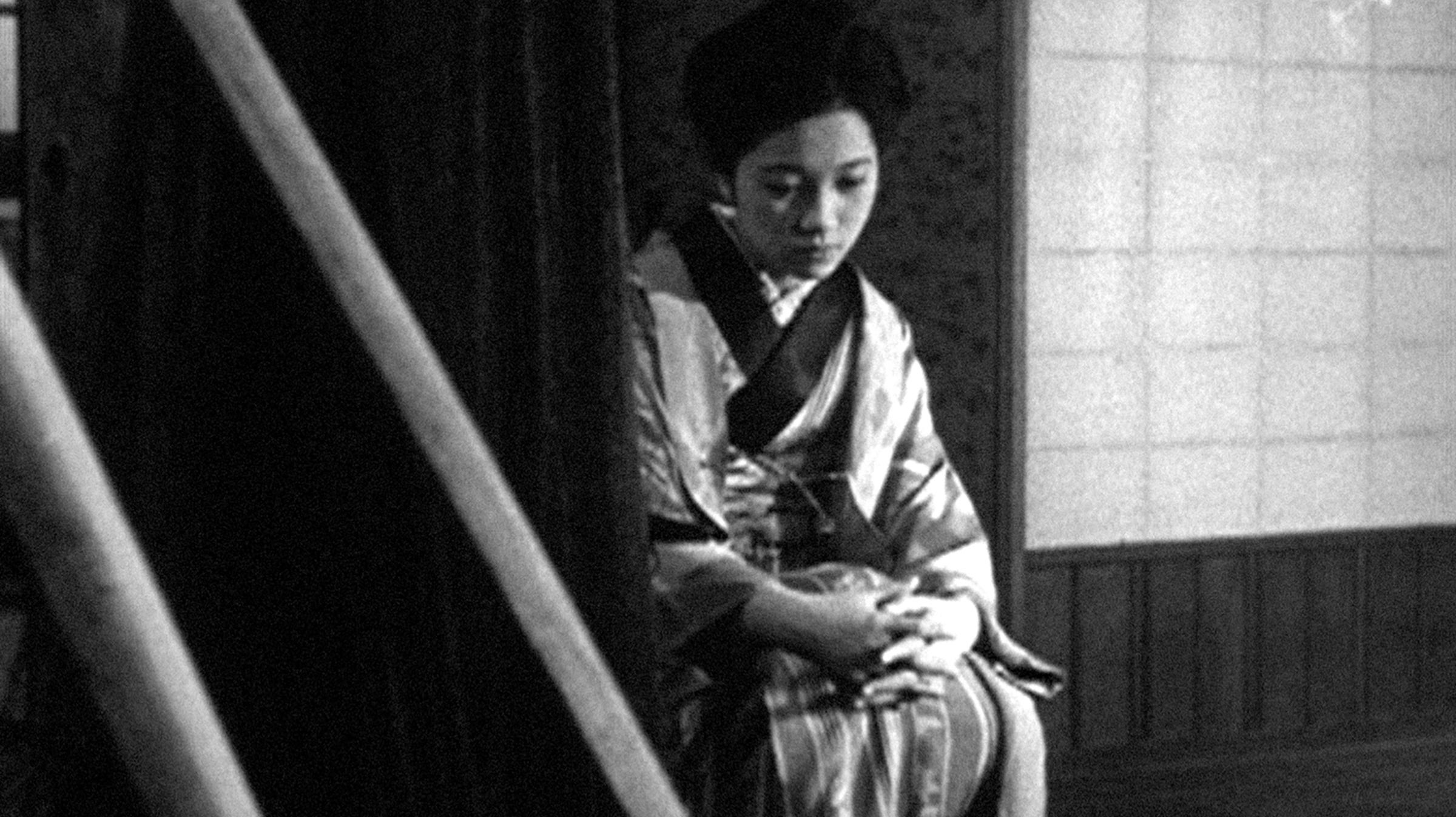Apart from You (Kimi to Wakarete) is Mikio Naruse’s third surviving silent film—one of only five we have left. Like many of his most celebrated works, it is an ode to the working class, the downtrodden and the disrespected, particularly women. Yet the man himself was no radical. Naruse, creator of the selfless, driven, deeply ethical geishas of Apart from You, was a studio loyalist; one who usually worked with an all-male crew; who never communicated with his actors more than necessary; who spoke little of his own politics and wrote no memoirs. His films still speak boldly, but he feels absent. We want to know him better.
Mikio Naruse was born in Tokyo in 1905 to a poor family. He joined Shochiku film company at age fifteen as a prop man, directing his first film there ten years later, the silent Mr. and Mrs. Swordplay, now lost. He moved to Photo-Chemical Laboratories (PCL, later Toho) in 1935, remaining at Toho for the rest of his career. A popular director who shared several top talents with Yasujiro Ozu, Naruse first became known overseas for his 1935 talkie, Wife! Be Like a Rose!, which continued themes he established in Apart from You and his other silents. His later sound work includes the masterful Late Chrysanthemums (1954), Flowing (1956), and, perhaps his most famous film, When a Woman Ascends the Stairs (1960).
Wider recognition, at least in the West, came late. For years Naruse did not receive the international attention his contemporaries did; film scholar Catherine Russell notes that “it wasn’t until a retrospective of twenty-four films in Locarno, Italy, in 1983 that the larger body of work began to circulate outside Japan.” Even today the director’s name seems a notch below Ozu’s, Mizoguchi’s, and Kurasawa’s, and his films are harder to find.
Naruse’s two earliest surviving films, Flunky, Work Hard (1931) and No Blood Relation (1932), are of a piece with Apart from You. Just under thirty minutes long, Flunky is a dark comedy about a hapless salary man with a wife, two kids, and little money. It’s loaded with visual effects—complex wipes, superimpositions, animation, and shots of undeveloped stock—most of them used to indicate the protagonist’s emotional state. In No Blood Relation, released the following year, we’re treated to a series of fast zooms on characters’ faces, indicating shock. Thick with melodrama, No Blood Relation tells the story of an impoverished stepmother whose husband goes to jail. Though she’s the only mother her stepdaughter has ever known, the law gives precedence to the girl’s birth mother—a wealthy actress who abandoned the family but has recently had a change of heart.
Apart from You shifted focus to the underclass. The film is about an aging geisha, Kikue (Mitsuko Yoshikawa), and a young one, Terugiku (Sumiko Mizukubo), trying to keep Kikue’s son Yoshio (Akio Isono) from turning to crime. By the end of the film, which is barely an hour long, Terugiku has confronted not only Yoshio (who’s hardly younger than she is), but also her own shiftless parents who want her younger sister to become a geisha as well, for the sake of their finances. Both young women, by virtue of their sex, are seen as commodities.
There is little camera trickery in Apart from You, especially compared to Flunky, Work Hard made only two years earlier. Aside from one use of double-exposure early in the film (a hungry geisha imagines herself a bowl of noodles), Naruse uses only quick zooms. As in No Blood Relation, these occur in scenes of conflict, the most memorable being Yoshio’s fight with Kikue. He asks her, “Why shouldn’t I drink? Look who I have for a mother.” The camera flies toward Kikue’s stunned and wounded face, then to Yoshio’s, already showing regret. Naruse occasionally filmed Terugiku the same way. But such is Mizukubo’s charisma that simple close-ups are more effective, and there are many of them in Apart from You—a generally quieter film. Naruse went on to make many more such quiet films.
For Naruse, it’s often poverty (or the threat of it) that costs people their dignity. In No Blood Relation it’s understood that the father would not have gone to jail if he’d been willing to take his ex-wife’s money. Wife! Be Like a Rose! casts both the husband and wife in unsympathetic light: he a dreamy prospector, she an unpaid poetry teacher (“Do poems make money?” “Hardly.”) Both are supported by more practical (female) loved ones. Auto accidents—sudden catastrophes that hit poor families hardest—occur frequently in the surviving silents. It is common to see sick or injured characters bedridden, sheets tucked up to their necks, surrounded by relatives or friends, in a state of total vulnerability.
Poverty and womanhood are states of being, not measures of moral worth. By juxtaposing women’s character with their social status, Naruse challenged both sexism and classism and shined a spotlight on the subpar quality of the men. All his greatest heroines serve men, whether as loyal wives or doting mothers, or waitresses, or geishas (a role that does not equate to prostitute, but carries with it, always, the threat of sexual exploitation). The men, by contrast, are needy, one way or another—lazy, scrawny, impractical, addicted—and remain so, no matter how much support they get, until the women explode with contempt. “Times aren’t that tough,” rages Terugiku at her father. “You’re just a drunken loafer!” To be male and rich is to have respect, deserved or not. Naruse’s heroines are handed nothing, but they earn our respect in the end.
Much is written nowadays about the expectations placed on women—how they must be all things to all people. Terugiku typifies this. To the men at the geisha house she’s a companion, a distraction, and a body. To her sister she’s a shield; to her parents, a source of income; to Kikue a friend. Yoshio, for whom Terugiku must be both mentor and guide, is the most complicated. He loves her, and why wouldn’t he? She is a beautiful woman possessed of a quiet certainty about the world, selfless and deeply moral; practically a saint. But she has her own problems, and no one’s helping her. “As sad as life may get,” she says, “I’ll manage.”
We know that Naruse understood all this, but not from anything he said. It’s only through filmmaking that he speaks to us. In Terugiku, he created a woman who must be judged by her actions, rather than her gender, wealth, birthright, or occupation—most of what makes up her identity. Naruse’s identity is likewise a poor guide to the man. While the director worked with two female screenwriters in his later career—Yoko Mizuki (seven films) and Sumie Tanaka (six)—much of his earlier work, addressing many of the same core themes, he wrote himself or with other men. He rarely socialized with his actors, female or male, and was infamous for giving no feedback, positive or otherwise, on their performances. When a Woman Ascends the Stairs star Hideko Takamine revealed some of what she knew of Naruse after his death. He had wanted to make a movie with no sets and no color, she said, “just a single white curtain as a backdrop.” She remembered him combing sets before filming, removing little props like flower vases and framed pictures. He seemed not only absent, but eager to perpetuate that absence. What remains are his actions: his work on screen.
How much, though, Naruse gave to us. To watch his best movies is to see our deepest held convictions acted out in something like daily life—a sort of religious praxis on film. You can’t help but reflect where you’ve fallen short yourself. Are you the giver or the taker? The supporter or the supported? And which do you want to be? Terugiku was that rare person who lives her convictions, and Naruse, if we can attribute any thought to him with certainty, wants us to be more like her.
Presented at SFSFF 2022 with live musical accompaniment by Guenter Buchwald

